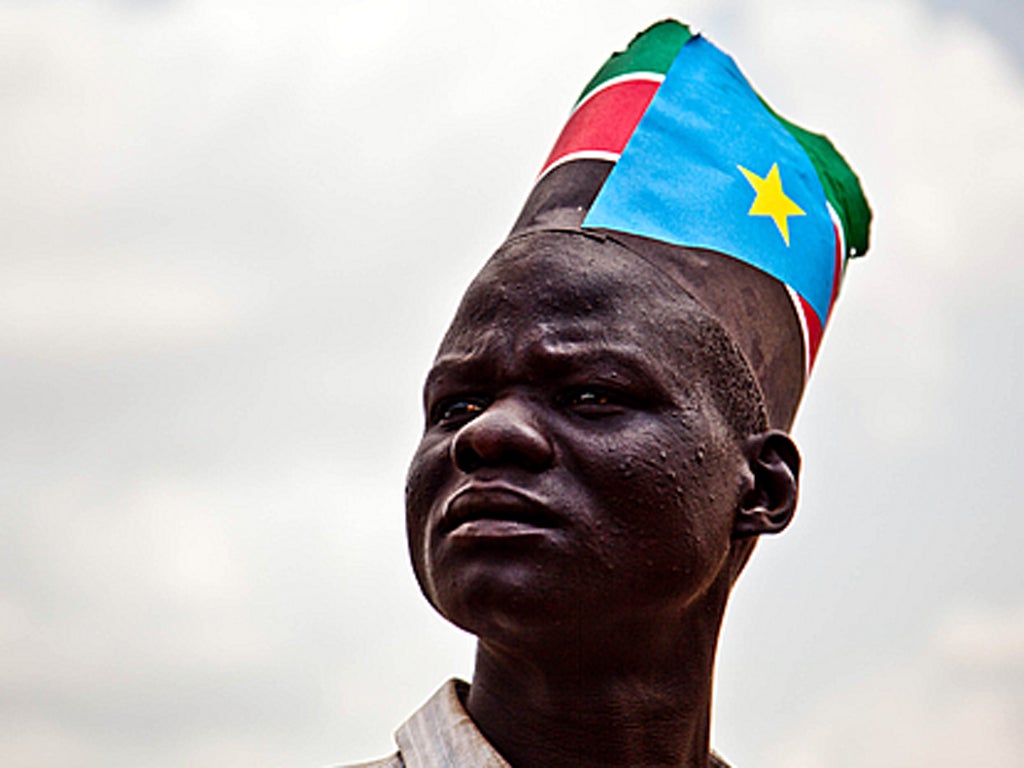Cymbeline: From war-ravaged South Sudan to the Globe Theatre
The incredible tale behind a Cymbeline in Juba Arabic

Your support helps us to tell the story
From reproductive rights to climate change to Big Tech, The Independent is on the ground when the story is developing. Whether it's investigating the financials of Elon Musk's pro-Trump PAC or producing our latest documentary, 'The A Word', which shines a light on the American women fighting for reproductive rights, we know how important it is to parse out the facts from the messaging.
At such a critical moment in US history, we need reporters on the ground. Your donation allows us to keep sending journalists to speak to both sides of the story.
The Independent is trusted by Americans across the entire political spectrum. And unlike many other quality news outlets, we choose not to lock Americans out of our reporting and analysis with paywalls. We believe quality journalism should be available to everyone, paid for by those who can afford it.
Your support makes all the difference.As part of the Cultural Olympiad, London's Globe Theatre this month plays host to 37 Shakespeare plays in 37 languages. Each has its own compelling story to tell. But of all the players from war-torn, drowned and oppressed countries, few can have made such an extraordinary journey as the South Sudan Theatre Company, which presents Cymbeline tonight and tomorrow.
Born in the camps where displaced people fled a 40-year civil war that claimed almost two million lives, the SSTC is a potent symbol of a country's new nationhood. Last July, South Sudan finally achieved independence from the north of Sudan, making it the youngest country to take part in the Globe to Globe festival.
"It is hard to describe how important this moment is for us," says co-director Joseph Abuk, the man who took on the translation of the play from Shakespearean English to Juba Arabic, a language without a dictionary. "It is a moment when we celebrate our freedom."
For more than two decades, it was impossible to read Shakespeare in South Sudan because the government in the north banned books written in English. Often the stories were passed on through word of mouth, but there were also contraband copies of Shakespeare plays in circulation.
"When we put the call out for Shakespeare productions from different countries, the proposal we got from SSTC was the single most compelling and irresistible," says Tom Bird, director of Globe to Globe. "It was six months before independence, and was written by the man who would go on to become the country's first minister for culture. He wrote that he used to lie in the Bush under the stars reading Shakespeare plays to avoid thinking about the killing that would happen the next day. No other proposal was like it."
In the hands of the SSTC the play's conflict between Ancient Britain and imperialist Rome takes on a new resonance as King Cymbeline's refusal to pay tribute becomes South Sudan's fight for freedom.
"When we read this man Shakespeare we think he was writing about us," Abuk says. "We can see all our problems and stories are in the play."
In a new country made up of many different tribal languages, SSTC chose Juba Arabic as a neutral lingua franca. It also appealed to Abuk and his colleagues to bring Shakespeare to England in a language that was at one time banned by the imperial British. "Juba Arabic grew up because the African people in the south were not allowed by the British to speak Arabic," he explains.
Translating the text was a painful process Abuk says. "There were many lines that nearly defeated me." The players have been rehearsing 3,500 miles from the South Bank, and it will be the first time they have flown in an aeroplane. "It will be very tough for our actors," Abuk says. "They need to breathe the air of London, acclimatise to the cold weather and become less nervous."
In many ways, Bird points out, the SSTC are close to the spirit of the Globe. "They are used to performing outside in daylight. Some of the companies coming from grand European theatres will have more of a shock."
Almost a year on from independence, war rages on in the disputed territories along the border of Sudan and South Sudan, and the challenges of poverty and a deep lack of development are manifold. As a symbol of hope then, Cymbeline is timely, reminding the new nation of its ambition to rise above its past.
'Cymbeline', Globe Theatre, London SE1 (020 7401 9919) today & 3 May
Join our commenting forum
Join thought-provoking conversations, follow other Independent readers and see their replies
Comments